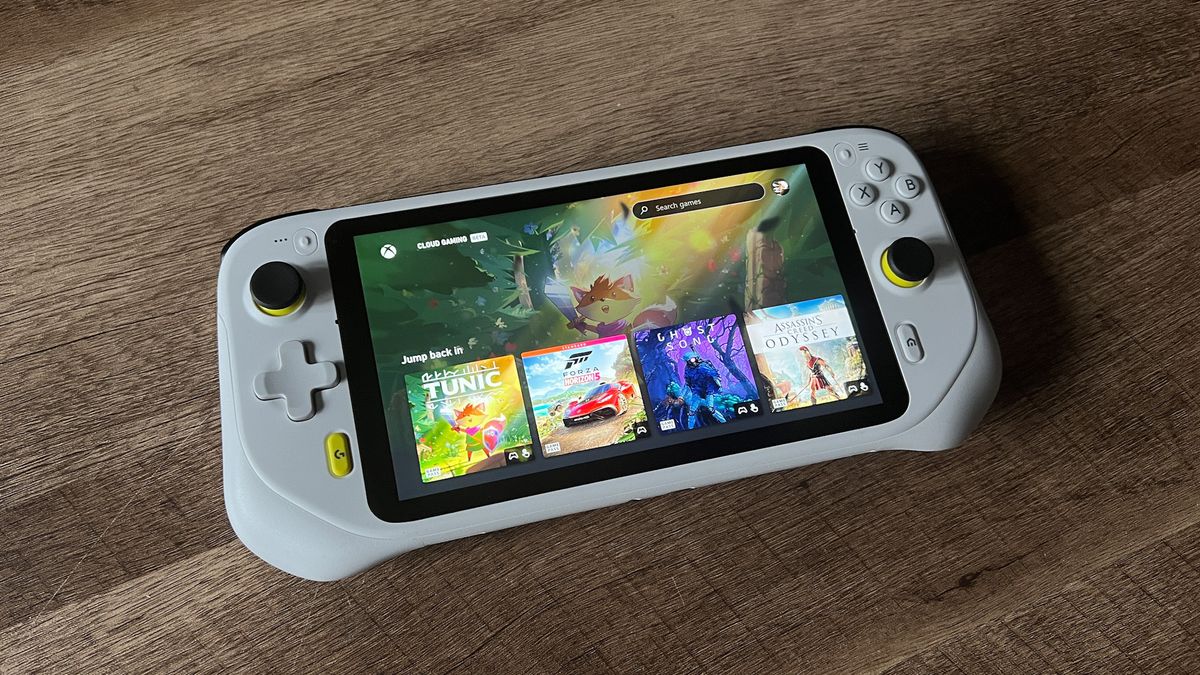12DOVE Verdict
The Logitech G Cloud is an exciting step into the future of streaming handhelds, offering a gorgeous form factor, generous display, and slick controls. It's not without its flaws though - not quite working hard enough to differentiate itself from a simple tablet device. The result shows us just how far we still have to go before we hit the streaming utopia it's aiming for.
Pros
- +
Vivid, bright display
- +
Comfortable form factor
- +
Crisp controls
- +
Great for game-hoppers
Cons
- -
Requires Game Pass Ultimate / GeForce Now to make the most of
- -
Little controller support for other services
- -
Relies on WiFi connection
Why you can trust 12DOVE
The Logitech G Cloud hit most markets in September 2022 (at the time of writing we're still waiting for a UK launch), and quietly settled into the background. The handheld cloud gaming machine is a strange one, though. Essentially an Android tablet running a Logitech OS and sandwiched inside a plastic white chassis, this is a Nintendo Switch for Xbox players - with one major caveat.
The nature of it being a cloud-based system means you're wholly dependent upon not just the existence of WiFi wherever you want to play, but also the strength of that connection. That puts it somewhere between the capabilities of a gaming phone and a gaming tablet. With both the Switch and Steam Deck already battling it out in this handheld console arena, the G Cloud has to put up an incredible fight to be relevant. The weird thing is, for the right audience - it just about gets there. I put the Logitech G Cloud to the test over the course of three weeks, running a range of different apps and games to see just where we are with streaming right now.
Key Specs
| Display | 7-inch 1080p @ 60Hz |
| Buttons | 2x thumbsticks, 4x face buttons, d-pad, 2x bumpers, 2x triggers, 2x option, G Button, Home |
| Processor | Snapdragon 720G |
| RAM | 4GB |
| Storage | 64GB |
| Haptics | Linear |
| Battery | 12+ hours |
| Ports | 3.5mm audio, USB-C charging / audio, microSD |
| Connectivity | Bluetooth 5.1, 2.4GHz / 5GHz WiFi |
Design
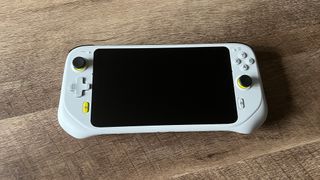
The Logitech G Cloud is the kind of device that makes you want to pick up and play. From the smooth-contoured edges of the grips to the playful yellow highlights under thumbsticks and on accent buttons, there's an alluring simplicity to this design. That plastic construction doesn't leave the G Cloud feeling cheap, there's a nice weight to the whole device, balancing nicely between the chunky grips and the main tablet panel.
While still slightly heavier than the Nintendo Switch OLED, I never felt fatigued in my Ghost Song sessions and could easily play for a few hours. That was helped along by the grooved lines running along the back of each grip, allowing for a comfortable, stable hold. Herein lies my only concern about the design, though. Like the Logitech G715 keyboard, that plastic coating can pick up some grub - and display it well. These grooves will prove tricky to keep in top condition.
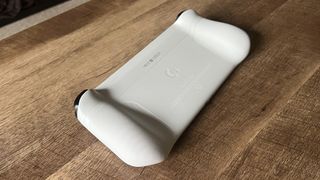
The controls run off a standard asymmetrical design, but you've also got a G Button on the left and a Home button on the right. Underneath the main tablet area, you'll find the stereo speakers, USB-C charging port, and 3.5mm audio out, and up top, you've got a power toggle, volume rocker, and micro SD slot sitting in between bumpers and triggers. Everything is where you'd expect to find it, and makes for a comfortable experience.
Features
Under the hood, you'll find a Snapdragon 720G processor, 4GB RAM, and 64GB of storage. Those are conservative specs, but it's a cloud-based device which means you're going to be relying far more on the server work of the apps you're using than usual. I only noticed this power downgrade while experimenting with some Google Play Store titles, which certainly take the hit a little further. You can, however, upgrade your storage via microSD if you're a Play Store power user.
There's also a 3D gyroscope, haptic feedback, and stereo mic built into the unit, nice-to-have features that won't see everyday use but can certainly take you by surprise when you come across a title that supports them. In my testing, these were rare, but I did note that the mic was relatively clear in some lighter use. A 6,000mAh battery runs the whole device, but thanks to that efficient processor, Logitech's 12-hour estimate rings true. Of course, different apps will eat up that power at varying rates. However, I was able to squeeze around a week of Xbox out of this thing, running for two or three hours a night.
Logitech has opted for an older OS here, running Android 11 in either the standard tablet mode or in handheld mode. The latter is where most people will find themselves, and where I spent the most time in my testing. The horizontal menu offering up your recently launched or downloaded apps and services makes this 7-inch Android tablet feel far more like a fully-fledged console. Navigating all these options feels slick and responsive as well.
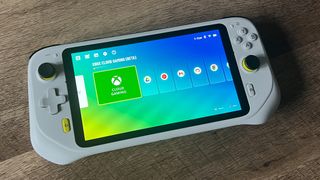
You'll find several pre-loaded apps in handheld mode; Xbox Cloud Gaming, Nvidia GeForce Now, the standard Xbox app, and Steam Link. Navigating to 'All Apps', however, reveals that the full Google Suite of software is also pre-installed - and can't be deleted. That's pretty frustrating for a $349 MSRP device, killing the console vibe immediately and opening you up to dreaded in-game notifications.
On the whole, though, everything is dressed up nicely here. A small menu in the top left corner gives you access to your Logitech Account, messages (though the Gmail integration does mean you run the risk of checking your inbox while tapping around), photos (you can take screenshots by pressing both option buttons at the same time), settings (where you can remap nearly every button), and power. That's all well and good, but those Google apps find a way to rear their ugly heads again. Simply nosing through these menu options will replace the gaming apps on your home screen with the Google services you've just 'opened'.
Performance
I'll kick off with the best thing going for the Logitech G Cloud - the display. This screen is gorgeous - clear and crisp, and with excellent colors running all across the scale. Blacks aren't as deep as the OLED screen on the latest Switch offers, but there's a vibrancy here that stands out considering this is a simple IPS panel. Of course, some of that clarity is lost when jumping into a streamed title, with a noticeable fuzziness around the picture. This didn't detract from my enjoyment of bolder titles like Tunic or Eastward, though. Such blurriness is a problem you're going to encounter on a range of devices, but the brightness and vividity on offer here certainly help these games shine as much as they can when streamed.
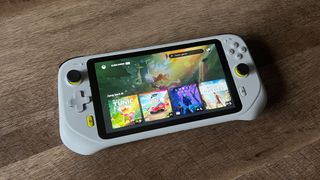
Controls are all super sharp and responsive, with tactile face buttons and smooth thumbstick action. The d-pad feels comfortable enough to take on more precise platforming adventures, it certainly didn't hold me back in Ghost Song and remained comfortable throughout Eastward as well. I personally prefer a little more of a snap to this action, though, with the current actuation verging on mushy after a little while.
Of course, the latency of those inputs is going to be determined by your WiFi strength. I did the majority of my testing at speeds between 134-158Mbps down and 20.9-21.2Mbps up and had no trouble in slower titles like Eastward and Tunic. I was wary of this vulnerability during more intense Ghost Song skirmishes and did notice a slight delay in Forza Horizon 4 though. It wasn't enough to pause play in the case of the former, but I did find it slightly too worrisome to fully relax behind the wheel. That's a condition of opting for a fully cloud-based device over something more substantial like the Steam Deck, but it's also a symptom of a larger issue.
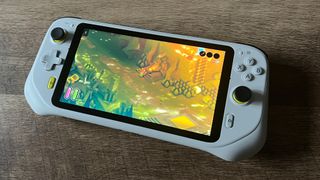
The Logitech G Cloud is, at its core, an Android tablet with a controller baked in. There's a solid UI here, and everything works within itself particularly well. However, there's nothing to improve upon your streaming experience. The Xbox Streaming 'app' on the home screen is simply a window to the web version of the service. PS Remote Play doesn't work unless you're using a separate gamepad (or the touchscreen control panel). Outside of streaming, the biggest Play Store titles like Call of Duty Mobile and Apex Legends simply don't recognize the G Cloud's controls. If you've already got a gaming phone or tablet, this isn't going to be a worthwhile addition to your arsenal. Logitech simply isn't doing enough with the G Cloud to make it feel like a tool for streaming, it simply facilitates it, in the same way, a lot of other devices do - for only slightly less than the Steam Deck.
Should you buy the Logitech G Cloud?
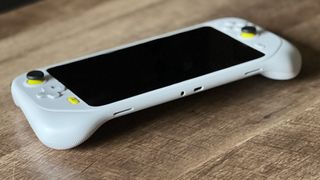
So, if the Logitech G Cloud isn't for those who already have a window into Xbox or Nvidia streaming, who is it for? It's for those who don't. If you're after a bigger screen than your phone can provide, or a higher quality navigation and display experience than your tablet offers, the G Cloud could well be a contender. This is for the Game Pass Ultimate power users, those who picked up streaming when Stadia took its first steps and are looking for their next move.
At this price point, though, you're likely also looking at the Nintendo Switch OLED and Steam Deck at the same time. Of course, the former can be ruled out if you're looking to access more than Ninty's library. The Steam Deck is the G Cloud's biggest nemesis, and if you don't want to be tied to a wireless connection, don't mind downgrading your display just a little, and want more access to the inner workings of your device, it's absolutely worth springing a little extra for.
That might all change in the next few years, as streaming works through its knots, and should Logitech add support for a more fluid experience.
How we tested the Logitech G Cloud
I used the Logitech G Cloud over the course of three weeks, testing primarily using Xbox Streaming services. I played Tunic, Eastward, Ghost Song, and Forza Horizon 4 on a 5GHz WiFi network with average speeds of 150MBps download and 21MBps upload. I played at home for the most part but occasionally tested streaming strength on other internet connections and via a 5G hotspot.
For more information on how we test, check out our full 12DOVE Hardware Policy.
If you're looking to make the most of streaming your games, check out the best mobile controllers and the best gaming earbuds.

Managing Editor of Hardware at 12DOVE, I originally landed in hardware at our sister site TechRadar before moving over to GamesRadar. In between, I've written for Tom’s Guide, Wireframe, The Indie Game Website and That Video Game Blog, covering everything from the PS5 launch to the Apple Pencil. Now, i'm focused on Nintendo Switch, gaming laptops (and the keyboards, headsets and mice that come with them), PS5, and trying to find the perfect projector.

Metaphor: ReFantazio wanted to fix the JRPG grinding problem, but Atlus went too far at one point and accidentally broke the whole combat system
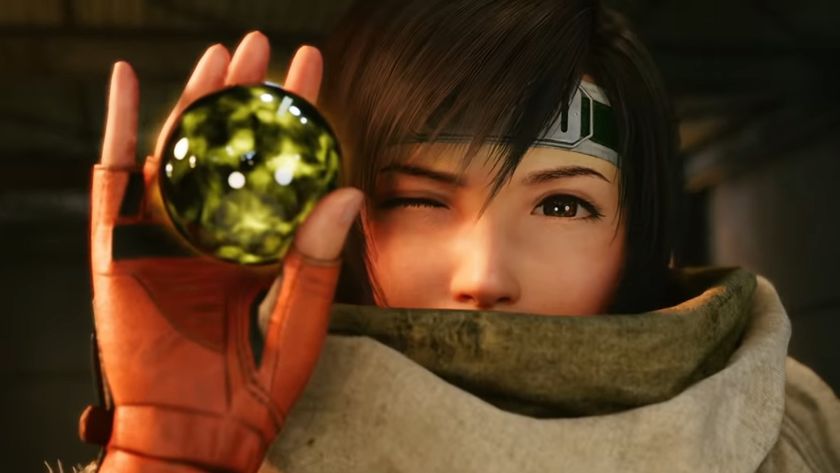
Final Fantasy 7 Remake and Rebirth battle director says combining everything he learned on Monster Hunter: World with Square Enix's technology and unique skills created a "chemical reaction"
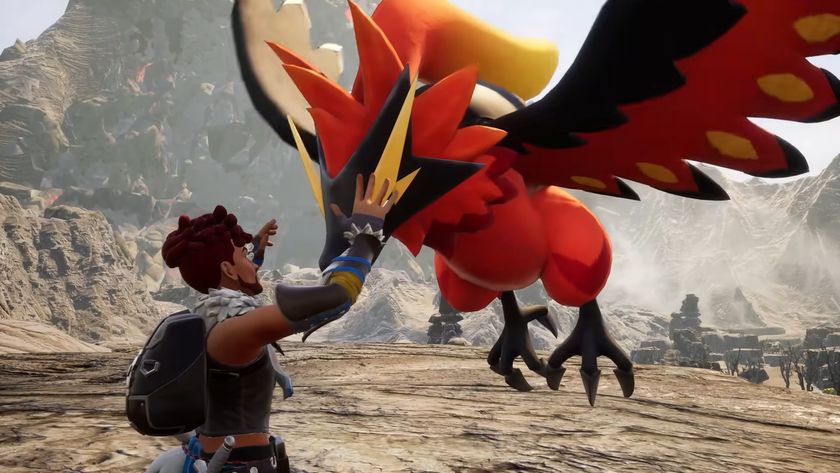
"Minutes after Palworld released," Pocketpair was already getting game pitches from "some really big names" before it even set up its own publisher: "No one has money at the moment"
